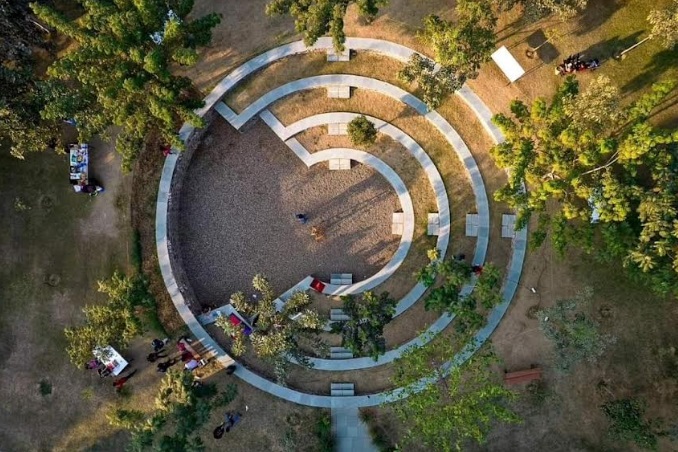For decades, global growth has been driven by fossil fuels, leading to climate change and environmental degradation. This challenge is particularly significant for the Global South, which must balance climate action with growth aspirations and development goals. High-quality research, innovative policies, cutting-edge technologies, and a well-educated workforce are some of the most important tools to address this challenge.
The Climate Institute will drive global research and enhance Ahmedabad University’s sustainability efforts
Ahmedabad University has launched The Climate Institute to address these challenges, focusing on three key aspects of research, education and impact. The Institute is developing India’s first comprehensive Climate, Energy, and Environmental education programme, preparing future leaders to tackle global climate issues. In the realm of research, it is expanding its capacity by recruiting new faculty, graduate student and postdoctoral researchers, encouraging interdisciplinary exploration. The Institute’s impact will be amplified by national and international partnerships that translate research into actionable policies while incubating and accelerating innovative approaches to address pressing environmental issues.
The Institute operates across three verticals: Energy and Climate Change, Cities and Settlements, and Air and Water. Building on the expertise of the Global Centre for Environment and Energy (GCEE), the Energy and Climate Change vertical focuses on climate change mitigation, energy transition, and policy innovation. The Cities and Settlements vertical leverages the University’s involvement in the Intergovernmental Panel on Climate Changes (IPCC) Sixth Assessment Report (AR6), exploring urbanisation trends and their relationship with climate change, with a focus on the Global South. The Air and Water vertical extends work from the University’s Air and Climate Research Lab. It will focus on integrating ground and space-based measurements to inform policy design in areas such as the impact of Short-Lived Climate Forcers (SLCFs) on air quality, health, and the establishment of a water quality lab for interdisciplinary research in water management.
The Institute will offer educational programmes at the undergraduate, graduate and post-graduate levels, and the curriculum is currently being developed in collaboration with the University’s schools and our national and international partners. The Institute will also offer Executive Education, providing programmes for mid-career professionals in government and industry, with Certifications in Sustainability for corporate professionals and specialized programmes in Climate and Energy for government employees.
The Climate Institute will serve as a platform for global research collaboration, hosting partnerships with universities from America, Europe, and Asia. Notable collaborations include the University of Chicago setting up an Energy Policy Institute at the University of Chicago (EPIC) Centre at Ahmedabad University, the International Growth Centre at London School of Economics (LSE) partnering for a Cities Conference in December, and a collaboration with Warwick University focused on energy and environment economics and policy. The Institute also aims to drive impact through fostering climate-tech startups in partnership with Social Alpha. It will also work closely with Central and State governments, while contributing to international reports from the IPCC and United Nations.
The Institute is founded under the leadership of Dr Balaji Srinivasan as Founding Executive Director and Professor Minal Pathak as the Academic Director. The initial key research areas are led by Professor Pathak for the Cities and Settlements vertical, Professor Anant Sudarshan for Energy and Climate Change, and Professor Aditya Vaishya for Air and Water.
The Advisory Board includes experts from academia and policy making, including Michael Greenstone, The Milton Friedman Distinguished Service Professor in Economics at the University of Chicago and Director of the Energy Policy Institute; Christopher Webster, Dean of the Faculty of Architecture at the University of Hong Kong and Senior Development Fellow at the University of Cambridge; Dr Shamika Ravi, Member of the Economic Advisory Council to the Prime Minister and Secretary to the Government of India; Rajagopalan Balaji, Professor and Former Chair in the Department of Civil, Environmental, and Architectural Engineering at the University of Colorado Boulder; Anu Ramaswami, Professor of Civil and Environmental Engineering, Princeton Institute for International and Regional Studies, and the High Meadows Environmental Institute; and Namrata Kala, Associate Professor in Applied Economics at MIT Sloan School of Management.
The launch of the Climate Institute also sits naturally with Ahmedabad University’s own efforts towards a more sustainable campus. The University was recently awarded the Indian Green Building Council (IGBC) Platinum Rating for its sustainable campus and has been recognised in the Times Higher Education (THE) Impact Rankings for its leadership in climate action. The University’s Arboretum project, initiated in 2018, has grown into a thriving mini urban forest with more than 1,500 trees, contributing to the city’s vital green lungs.
About Ahmedabad University
Ahmedabad University is a leading private, non-profit research university offering students a liberal education focused on interdisciplinary learning, practice orientation, and research thinking.
The University has been
Recognised by the Government of Gujarat as a Centre of Excellence.
Accredited with A grade by the National Assessment and Accreditation Council (NAAC).
Awarded a 5-star rating, the highest awarded in the Gujarat State Institutional Rating Framework (GSIRF) for 2021-22, by the Knowledge Consortium of Gujarat (KCG), Department of Education, Government of Gujarat.
Awarded the Royal Institute of British Architects (RIBA) International Award for Excellence 2024 for our University Centre.
Awarded a Platinum Rating by the Indian Green Building Council for sustainability and green practices.
Recognised by the UGC under Section 12(B) of the UGC Act, becoming one of the very few private research universities to have been awarded this recognition for select research universities.
Recognised as a Highly Commended University for Teaching and Learning Strategy of the Year in the Times Higher Education (THE) Awards Asia 2023.
Awarded the AACSB’s Innovations That Inspire Award 2023 for its Foundation Programme.
Awarded Gold Rating by the Indian Green Building Council for achieving the Green Building Standards at our University Centre.
The University, established in 2009, is rooted in the vision of one of India’s finest educational foundations, the Ahmedabad Education Society, which was founded in 1935 by nationalist leaders. Programmes at the University range from bachelors to doctoral levels in humanities and social sciences, natural sciences, engineering, and management through its 13 Schools and Centres:
Amrut Mody School of Management | Bagchi School of Public Health | School of Arts and Sciences | School of Engineering and Applied Science | Ahmedabad Design Lab | Centre for Heritage Management | Centre for Inter-Asian Research | Centre for Learning Futures | Global Centre for Environment and Energy | International Centre for Space and Cosmology | Sahyog: Centre for Promoting Health | The Climate Institute | VentureStudio
An urban university, Ahmedabad promotes independent-mindedness and diversity across all dimensions of its activity and helps students mature into critical thinkers who are analytically equipped, practically oriented, and contextually aware global citizens. The University provides a contemporary educational framework that brings liberal arts, sciences, and the professions to engage together in creating new knowledge for addressing complex challenges of the society and in offering majors that merge the boundaries of disciplines to prepare students for the new economy.











